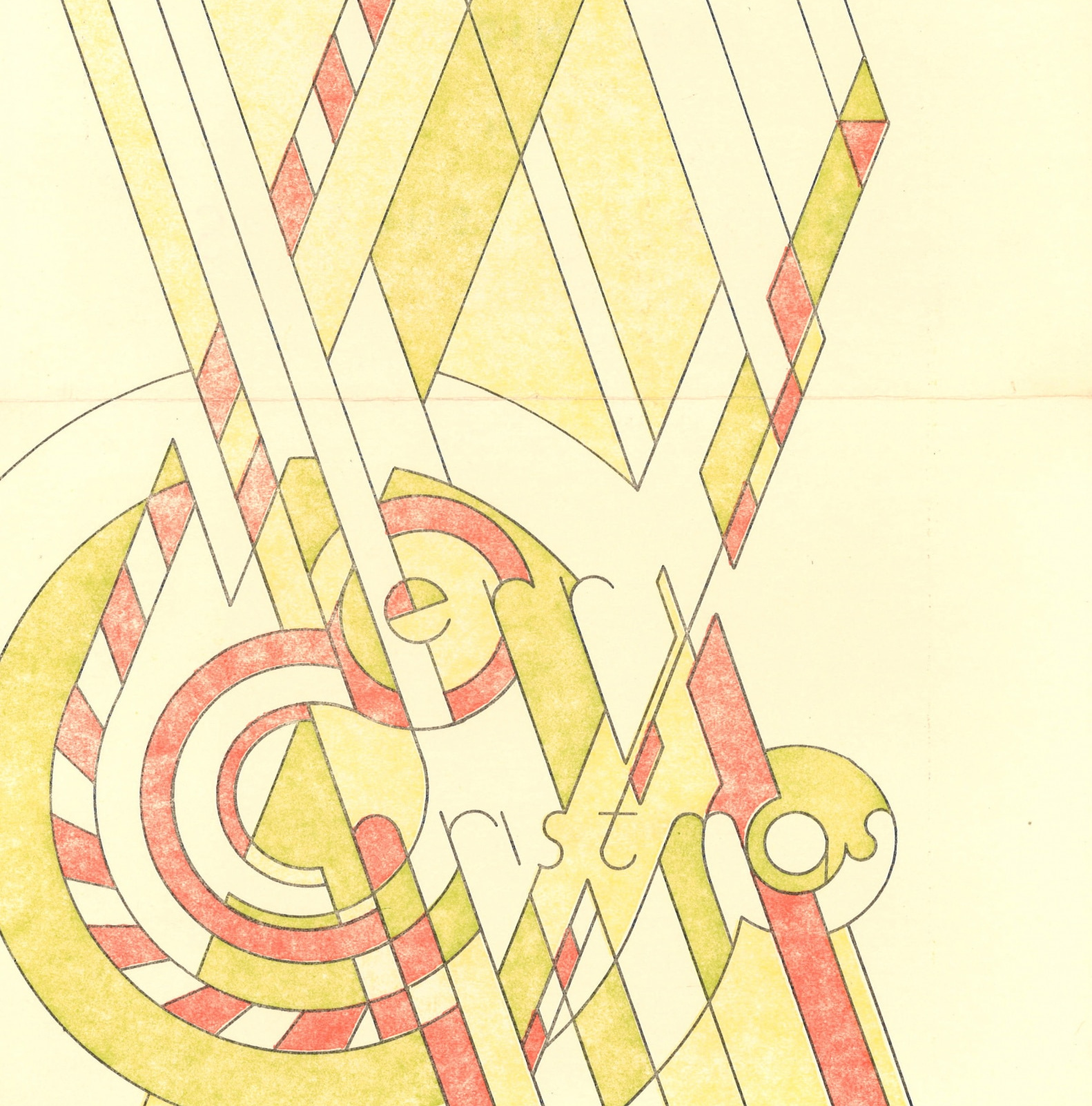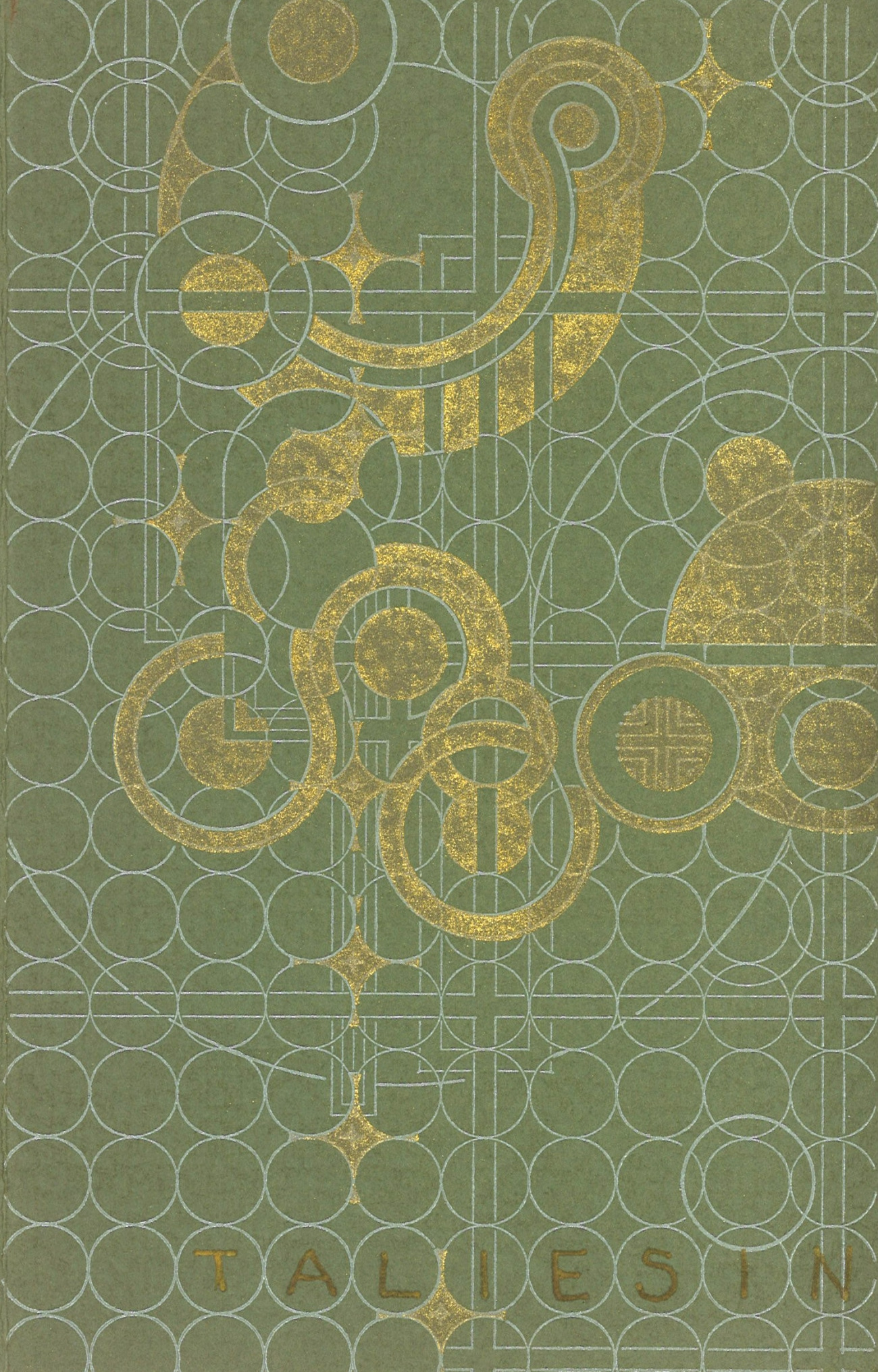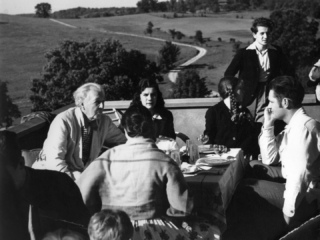
Our House: Christmas 1958 at Taliesin West
Olgivanna Lloyd Wright | Dec 20, 2019
Olgivanna Lloyd Wright, Frank Lloyd Wright’s wife, wrote a series of essays titled, “Our House” for the Capital Times of Madison, Wisconsin from 1958-1962. Here, in this December 1958 writing, she shares an intimate account of Frank Lloyd Wright’s final Christmas celebration at Taliesin West.
Header image: 1983 holiday card, from a design by Eugene Masselink
Before dinner on Christmas Eve, Mr. Wright and I sat quietly in my room and I read aloud to him the Sermon on the Mount. I often stopped that we might contemplate the immortal words that no can supersede…“…Blessed are they which do hunger and thirst after righteous…For I say unto you, that except your righteousness shall exceed the righteousness of the Scribes and Pharisees, ye shall in no case enter into the Kingdom of Heaven.”
After dinner we went into the living room, where the Christmas tree stood fragile, slim, this time decorated delicately with tiny flickering lights. We opened our presents by the large fireplace which blazed off and on as we threw in the wrappings.
Mr. Wright received many beautiful books on art, works of art-antique bowls, sculpture, wood carvings, handwoven shawls, stoles, robes… The members of our family exchanged gifts—my big brother, Vlado, and his wife, Sophie, glowed with pleasure, trying on clothes or smelling their perfumes and colognes. There were screams of delight from our daughter, Iovanna, and grandson, Brandoch. Towering Wes, Gene and our faithful engineer, Mr. Glickman supported the occasion.
On the morning of the 25th, the “Taliesin Gift-Syndicate” brought beautiful gifts to Mr. Wright and me. John Rattenbury made two large glass mosaic tables for us of such extraordinary beauty that it was hard to take our eyes from them. Gene Masselink made a screen of unmatched beauty for our living room. It is of light cypress, and the design is carved, and cut through, with stained glass inserts and gold leaf. Mr. Wright stood the screen in just the right place in the garden room.

1980 Christmas card, printed at the Taliesin Press by Peter Rott, Ling Po, and Indira Berndtson. Original art by Charles Schiffner.

1984 holiday card, art by Eugene Masselink, 1955.
Several apprentices made an unusual wind breaker of white plastic and plywood in a circular pattern for Mr. Wright’s sun terrace. And many other beautiful works of art were made and given to us by our young people.
To various groups in the living room Mr. Wright and I distributed gifts. He spoke to them of the joy of giving and receiving. Before they left, Mr. Wright asked them to read the Sermon of the Mount.
Young faces were beautiful, receptive and those very new ones whom we have known for as short a time as a month appeared to come closer, cutting shorter the time it takes to become enlightened members of Taliesin.
Our lovely girls came in to receive gifts from us, —they looked happy, radiant, with sunlight in their eyes and those came who have been at Taliesin many years—those who have woven their lives with ours for 25 years or more.
From early morning and all day long people forgot about themselves, giving to others gifts they made or could afford to buy, crossing the apprentice court or the path to the sun cottage, down the bougainvillea pergola and up the trails to the tents and multicolored tin foils and gay ribbons sparkled in the sun. The Taliesin children ran back and forth happily, bright and excited with their gifts.
And when the evening came, we all gathered in the living room for the singing of the carols. The only guests that joined us on this Christmas occasion were former Sen. William Benton, his beautiful wife, and two of their children, Louise and John. John and Brandoch have been friend since childhood. They met shortly after the death of Brandoch’s mother and have remained close through the years—they are now 17.
We stood up, some 100 of us, and sang carols as we have done all the previous years. We particularly enjoyed singing “Silent Night.” The voices were as one. When we walked to the theater the moon was already high, streaming down its pearly light and there was a feeling of union among us—a deep sense that only from the spirit issues the possession of life.
After dinner we saw the moving picture, “Magdalena,” the image of Mary Magdalene interpreted by Italians in modern terms. A soul who lost her way, whose share in life was tragedy, and who at the end was stoned by the people of the village. Through her agony she found redemption and peace in the last moments of her life.
We could not talk after the film ended, and walking out quietly, we bid each other good night under the blue-gold light of the desert moon. ∎

1986 holiday card, from a design by Hilary Tachovsky.
This essay originally appeared in the December 29, 1958 issue of the Capital Times of Madision, Wisconsin.



